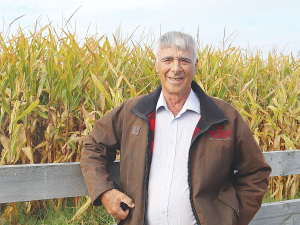Hitting heifer liveweight targets
Early December marks a key transition for many dairy farmers, as weaned replacement heifers head off-farm to grazing.
 Bay of Plenty dairy farmer Doug Leeder says maize yields in the region are the best seen in five years.
Bay of Plenty dairy farmer Doug Leeder says maize yields in the region are the best seen in five years.
It's been a bumper season for maize and other supplements in the eastern Bay of Plenty.
Well-known dairy farmer and local body politician Doug Leeder says maize yields in the region are the best they have been for the last five or six years. In the past couple of years a series of rain events have seen significantly lower yields in both the maize and silage takes.
But Leeder says this year the maize yields have been in the order of 25 to 30 tonnes per hectare which he adds is big.
“It seems the stars have all been aligned this year and when you are running a biological system, things like this can happen,” he says.
Leeder says while maize yields have been really good, yields of surplus grass have also been exceptionally good.
“We have got silage for Africa here in the Bay of Plenty, so much so that contractors have even been offered grass for free by farmers so that they can clean up their paddocks,” he says.
Leeder says it augers well for the winter and spring but notes that seasons tend to equal themselves out and while there is a great surplus of conserved feed now, a harsh winter could change all that. He says with the tremendous grass growth, cows are heading into calving and mating in very good condition.
On his own farm where he runs about 500 cows, Leeder says the greatest challenge this season has been managing the very good grass growth. He says this makes for a potentially rewarding season and he’ll be a lot better off financially – especially if the payout is around the $8/kgMS mark.
Fonterra’s impending exit from the Australian dairy industry is a major event but the story doesn’t change too much for farmers.
Expect greater collaboration between Massey University’s school of Agriculture and Environment and Ireland’s leading agriculture university, the University College of Dublin (UCD), in the future.
A partnership between Torere Macadamias Ltd and the Riddet Institute aims to unlock value from macadamia nuts while growing the next generation of Māori agribusiness researchers.
A new partnership between Dairy Women’s Network (DWN) and NZAgbiz aims to make evidence-based calf rearing practices accessible to all farm teams.
Despite some trying circumstances recently, the cherry season looks set to emerge on top of things.
Changed logos on shirts otherwise it will be business as usual when Fonterra’s consumer and related businesses are expected to change hands next month.
OPINION: Fonterra may be on the verge of selling its consumer business in New Zealand, but the co-operative is not…
OPINION: What does the birth rate in China have to do with stock trading? Just ask a2 Milk Company.